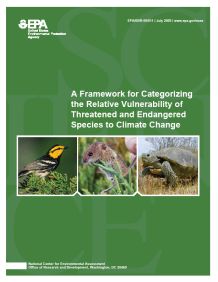A Framework For Categorizing the Relative Vulnerability of Threatened and Endangered Species To Climate Change (External Review Draft)
Alert
Notice
EPA announces the release of the draft report, A Framework for Categorizing the Relative Vulnerability of Threatened and Endangered Species to Climate Change (External Review Draft) in a November 25, 2009 Federal Register Notice. This draft report is provided for public viewing and comment. Public comments received on the draft report within 30 days after the release of the FRN will be considered by EPA in their revisions.
Update: EPA is annoucing an extension for an additional 30-day comment period that began on February 23, 2010, and ends March 25, 2010. Comments should be in writing and must be received by EPA by March 25, 2010.
Abstract
NCEA/ORD has developed an evaluative framework that may be used to categorize the relative vulnerability of species to climate change. This framework is intended to provide information to ecosystem and resource managers to support their decision making about management actions that reflect consideration of those threatened and endangered species that are most vulnerable to climate change. This framework also may be helpful in supporting management decisions related to species not listed as threatened or endangered. This report has undergone external peer review and is now posted for public comment. The framework in this report was developed by Hector Galbraith of Manomet Center for Conservation Sciences and Jeff Price of World Wildlife Fund. Review, comments and general oversight of this work were provided by the Global Change Research Program (GCRP) in the National Center for Environmental Assessment (NCEA), U.S. Environmental Protection Agency (U.S. EPA). This report has undergone peer consultation and external peer review, including review of the first draft in 2002 by the U.S. Fish and Wildlife Service within the Department of Interior. The report is now posted for public comment. When publishing the final report, EPA will consider all comments received during this public comment period.
The framework in this report was developed by Hector Galbraith of Manomet Center for Conservation Sciences and Jeff Price of World Wildlife Fund. Review, comments and general oversight of this work were provided by the Global Change Research Program (GCRP) in the National Center for Environmental Assessment (NCEA), U.S. Environmental Protection Agency (U.S. EPA). This report has undergone peer consultation and external peer review, including review of the first draft in 2002 by the U.S. Fish and Wildlife Service within the Department of Interior. The report is now posted for public comment. When publishing the final report, EPA will consider all comments received during this public comment period.
The framework presented in this report may be used to categorize the relative vulnerability of species to climate change. There are four modules that compose this framework. These modules walk the user through a systematic process for (1) categorizing a species’ baseline vulnerability to extinction or major population reduction, (2) categorizing a species’ vulnerability to future climate change, (3) developing a matrix that gives an overall score of the species’ vulnerability to non-climate and climate change stressors, and (4) qualitatively determining the uncertainty in the estimate of a species’ vulnerability.
This framework is not intended to serve as a tool for determining whether a species is endangered or threatened under the Section 4 listing process of the Endangered Species Act, but rather to provide information to resource managers to help guide management decisions related to threatened and endangered species.
Impact/Purpose
NCEA/ORD has developed an evaluative framework that may be used to categorize the relative vulnerability of species to climate change. This framework is intended to provide information to ecosystem and resource managers to support their decision making about management actions that reflect consideration of those threatened and endangered species that are most vulnerable to climate change.Citation
U.S. EPA. A Framework For Categorizing the Relative Vulnerability of Threatened and Endangered Species To Climate Change (External Review Draft). U.S. Environmental Protection Agency, Washington, DC, EPA/600/R-09/011, 2009.History/Chronology
| Date | Description |
|---|---|
| 01- Mar 2002 | Peer consultation (DOI and external reviewers). |
| 02- Jul 2005 | External letter review. |
| 03- Nov 2009 | EPA releases the External Review Draft for public review and comment. |
Additional Information
Comments on the assessment may be submitted and reviewed using the e-Government Regulations.gov Web site. From the site, select Environmental Protection Agency and the key word EPA- HQ-ORD-2009-0816 (for the docket ID).Download(s)
This download(s) is distributed solely for the purpose of pre-dissemination peer review under applicable information quality guidelines. It has not been formally disseminated by EPA. It does not represent and should not be construed to represent any Agency determination or policy.
